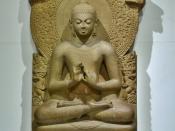For centuries, Buddhism has been the dominant religion of the eastern world (Bowker, 56). Today it remains the predominant religion in China, Korea, Japan, and much of Southeast Asia. There is over 0.2%-0.1% billion Buddhism in the world (Bowker, 67). Presently, there are over 300,000 Buddhists in the United States ( Bowker, 67). Even the governor of California Jerry Brown accepted the religion ( Bowker, 56).
Buddhism began as an offspring of Hinduism in the country of India (Bowker, 66). The founder of Buddhism was Siddhartha Gautama (Bowker, 56). Siddhartha was born in the 560 B.C. in India ( Bowker, 45). His father, Suddhodana, was a ruler over a district near the Himalayas which is today the country of Nepal ( Bowker, 46). Gautama eventually turned to life of meditation ( Bowker, 67). While deep in meditation under a fig tree known as the Bohdi tree ( meaning "tree if wisdom"), ( Harris, 11), Gautama experienced the highest degree of god-consciousness called nirvana ( Harris, 11).
Gautama then became known as Budda, the "enlightened one " ( Harris, 11). He believed he had found the answers to the questions of pain and suffering ( Harris, 11). As he began his teaching ministry, he gained a quick audience with the people of India since many had became disillusioned with Hinduism ( Harris, 11). By the time of his death at age 80, Buddhism had became a major force in India ( Harris, 12). Three centuries later it had spread to all of Asia ( Harris, 11). However, seven hundred years later, followers of Budda began to worship him as deity ( Harris, 13).
Three important concepts in understanding Buddhism are karma, samsara, and nirvana ( Harris, 12). Karma refers to the law of cause and effect of a person's life, reaping...


